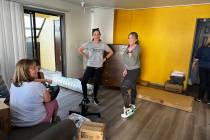Millennials: Here’s how to save for a down payment
Millennials who are paying high rent and making student loan payments might find it daunting to save to buy a house. For some, it’s impossible. Others might be able to do it if they have the discipline to set aside money rather than spend it.
The biggest mountain for most millennial homebuyers is the down payment, says Karen Carr, a financial planner with Society of Grownups, a financial planning firm in Boston.
Down payment
Money from your savings that you give to the home’s seller. A mortgage pays the rest of the purchase price. It’s usually expressed as a percentage: On a $100,000 home, a $13,000 down payment would be 13 percent.
The best way to climb that mountain is to start, even if the undertaking seems huge and you set aside small initial amounts.
“Just get started,” Carr suggests. “Start setting something aside as savings every month, no matter how big or small. You can always build on it.”
The way to save
A good way to set a monthly saving goal is to subtract your current rent from your estimated mortgage payment, including principal, interest, property tax, homeowner insurance and mortgage insurance. Save the difference.
This strategy has two huge benefits, Carr explains. One benefit is building your savings. The other is getting used to your anticipated budget as a homeowner.
“If you’re consistently not able to meet that savings target, maybe it’s time to rethink your housing budget and get a little more realistic,” she says.
Saving doesn’t have to be all about cutting and budgeting. Rather, it’s “swapping something now for something you want more down the road,” Carr says.
Visual images, like a picture of the type of house you want to buy, can help.
“Remind yourself on a daily basis why you’re making the trade-off,” Carr suggests.
Where to find savingS
One good place to look for savings is literally a place, that is, your current home, says Ronit Rogoszinski, wealth adviser at Arch Financial Group in Garden City, New York.
If you’re paying 30 percent or more of your income for rent, consider moving to a cheaper apartment so you can set aside more money every month to buy a home.
“It’s great to want to live in downtown Manhattan, but you’re paying $2,400 a month,” Rogoszinski says. “That’s not going to work. A lot of people need to have that reality check.”
To find more savings, you’ll need to dig deeper and scrutinize every expense.
“Do you need to spend $300 a month for a gym membership versus $10 a month? Or could you get committed to running free every day versus paying a gym fee? Can you brown-bag your lunch instead of eating out every day? Do you buy on sale or do you buy randomly whenever something strikes your fancy?” she says.
One other idea is admittedly a long shot, but worth a try: Talk to your employer about moving your work location to an area with lower-cost housing.
“There are pockets of the country where housing is off the charts and there are pockets where it’s incredibly affordable, but the jobs aren’t there,” Rogoszinski says.
Market timing
Millennials might well be concerned that home prices or interest rates could rise while they accumulate savings, making it more costly for them to buy — or pricing them out of certain markets.
Indeed, home prices have already gone up sharply in some areas, says Michelle Velez, a mortgage sales manager in San Mateo, California.
“The longer they wait, the longer they feel they won’t be able to purchase anything, so they want to purchase sooner rather than later,” she says.
Carr has a different take. She thinks a lot of millennials prefer to delay buying a home despite the risk of higher prices and rates.
“There’s a lot of pressure around: ‘Is this the right time to buy? There are a lot of benefits if I do it right now,’” she says. “But are you willing to pay a slightly higher price and slightly higher rate to feel extra confident that you’re on a firm financial foundation? To me, that would be worth it in both cases.”




















